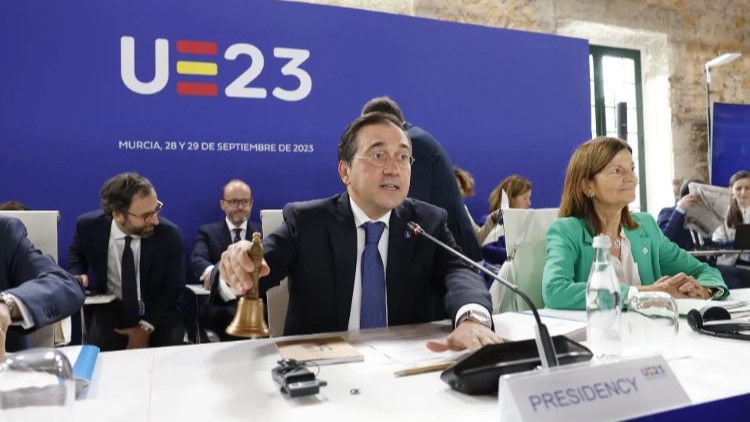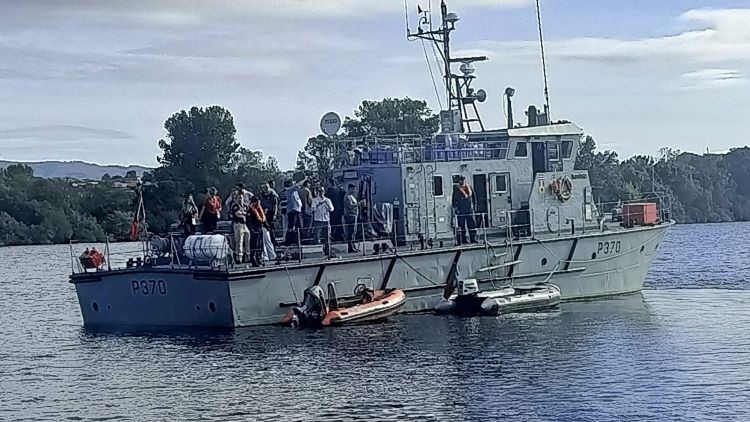Eduardo González
The 27 EU Member States will once again discuss the official use of Catalan, Basque and Galician at the meeting of the General Affairs Council (GAC) on October 24, as announced yesterday by the acting Minister of Foreign Affairs, José Manuel Albares, during the first day of the informal ministerial meeting on General Affairs and Cohesion Policy, which is being held in Murcia.
“We have made progress on the proposal, which we agreed to work with 27 on the introduction of Catalan, Galician and Basque in the multilingual regime of the EU,” said the minister, at the end of the meeting, during the joint press conference with the European Commissioner for Neighborhood and Enlargement, Olivér Várhelyi. The officialization of these three languages in the EU is one of the commitments assumed by the acting President of the Government, Pedro Sánchez, with the Catalan pro-independence supporters in order to obtain their support in the investiture vote.
“I have announced to all EU ministers that we will include in the agenda of the next GAC,” to be held on October 24 in Brussels, “a specific point to respond, during this month, to as many questions raised as we can by the Member States,” he continued.
“I have once again recalled the almost unique specificity of the co-official Spanish languages, included in our Constitution, with use in both Chambers in the plenary sessions of both the Congress and the Senate, and which have had administrative agreements in the EU for almost twenty years,” he added. “Above all,” he assured, “I have once again noted the willingness of all EU countries to work with Spain on this proposal.”
“No Member State has taken the floor to point out any aspect that worries or concerns it, or to hinder it,” and, as in the previous GAC in Brussels, “no one, and they could have done so, raised any veto in this regard,” he assured. “Therefore, we continue to move forward according to the commitment of the Government of Spain and we will continue to work to accommodate any comments that any Member State may have in view of October 24 and continue to move forward,” he concluded.
On September 19, the Government sent José Manuel Albares himself to the meeting of the General Affairs Council – which is usually attended by the Ministers or Secretaries of State who deal directly with European issues – in order to obtain the support of the EU-27 for the European officialization of the three languages. However, the European partners decided that same day that there was no urgency in making the official use of these languages official and opted to postpone any decision on the matter pending a legal opinion of the EU Council on the consequences of the measure and an analysis of the economic, political and practical impact it would have.
Aid to Nagorno-Karabakh
At the same press conference, Albares announced that Spain will make “a first contribution of one million euros in humanitarian aid” to assist Armenians who are fleeing “unjustly” from the enclave of Nagorno Karabakh, after Azerbaijan regained control of the territory last week.
He also reported that, just yesterday, Spain activated “an additional contribution through the Red Cross” to act in this humanitarian crisis and recalled that Spain’s contribution “is already present” in the area through the Spanish Agency for International Cooperation for Development (AECID). This aid, he said, is channeled through agreements with the organizations Action Against Hunger and Caritas, which are supporting 4,000 families. “We are going to be very vigilant about the future of this population that is having to leave Nagorno Karabakh,” he said.
Enlargement and Open Strategic Autonomy
The first day of the Murcia meeting (which concludes today) focused on two main points: the enlargement of the EU and the so-called Open Strategic Autonomy.
Regarding the former, Commissioner Olivér Várhelyi assured that the 27 are “creating the possibility for the accession of the candidate countries but also launching an internal debate in the EU on how to achieve this enlargement”. “This Commission has always been a strong advocate of enlargement and these political changes around us (referring to Russia’s aggression in Ukraine) also show that the long-term security, peace and stability of the EU are going to depend hugely on the success of enlargement,” he said.
However, he warned, yesterday it was confirmed “that enlargement is a merit-based process, which means that the candidate countries, our partners, also have to meet the various criteria for EU membership, criteria which are well known.” For this reason, he continued, “discussions have begun on how we can help the candidate countries to accelerate their reform process and to analyze formulas that can allow the acceleration of this process” in aspects such as institutional reform, gradual integration and the rule of law and democracy.
The Commissioner did not want to advance dates for the accession of new members, because “the most important thing is that we have the necessary tools for enlargement to become a reality”, a task which, he said, corresponds to the Commission, “which has to put all the tools on the table to speed up the new accessions”. However, he recalled, the President of the European Council, Charles Michel, has launched “a very clear message behind closed doors”: the Council, “which is the body in charge of taking decisions, has to be ready to admit new members to the EU before 2030, and as soon as the Council is ready, the Commission, without a doubt, will be ready”. In this case, he specified, “the question is whether the candidate states are going to be ready by 2030”. “We are going to work so that the Council is ready and also so that the candidate States are ready,” he concluded.
Regarding Open Strategic Autonomy, Albares warned that “in the Europe of the 21st century, strategic dependencies have also become vulnerabilities” and, therefore, it is necessary to overcome these vulnerabilities in “key sectors” health, food, energy and the digital sphere and to “face the blackmail of third parties, as we have seen very recently in the energy case, and to face global crises in a more solid way”.
In this regard, the minister recalled the report Resilient EU 2030, the approach that the Spanish Presidency will contribute during the European Council meeting on October 6 in Granada, as a basis for reflection to strengthen Open Strategic Autonomy and Global Leadership. This document, according to Albares, “compiles some of the vulnerabilities of the EU that we must face in the next ten years, and proposes lines of action to strengthen our production capacity, and I have pointed this out during the meeting”.







